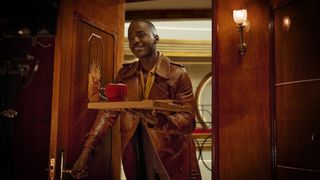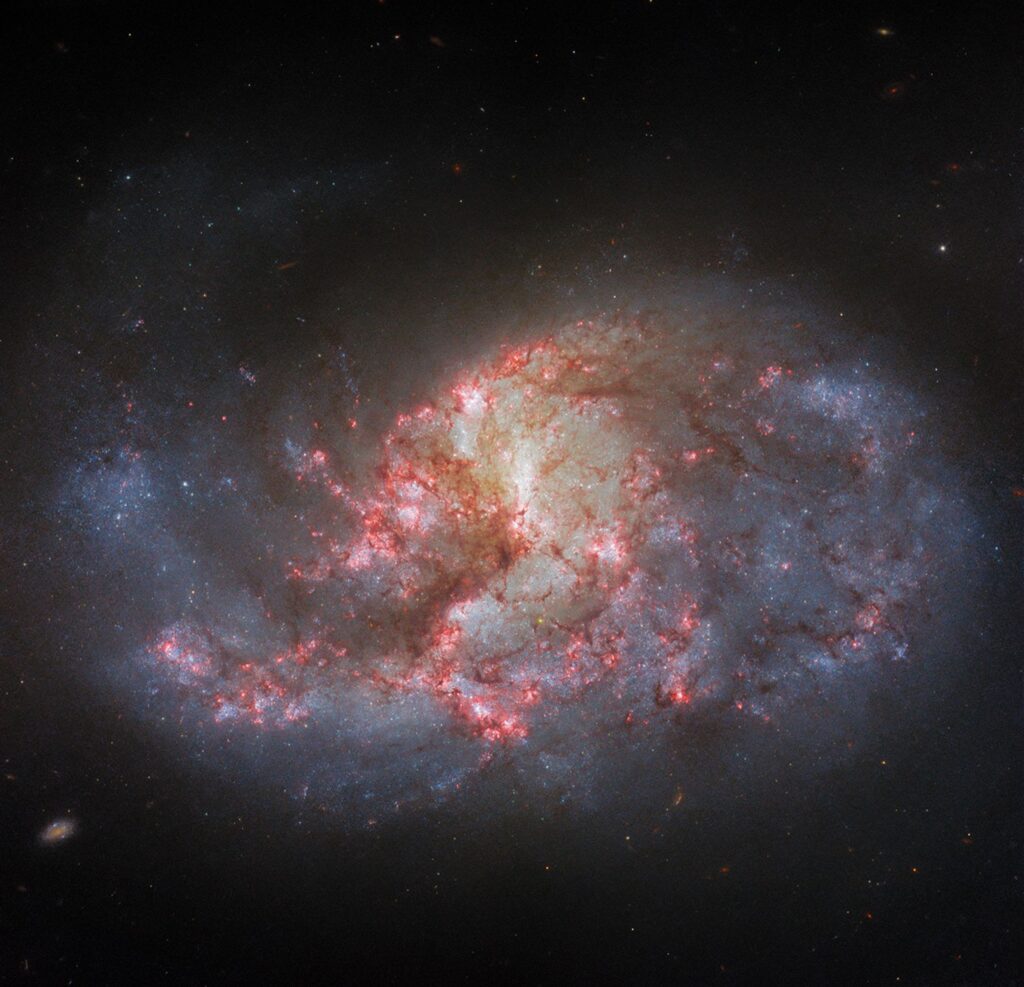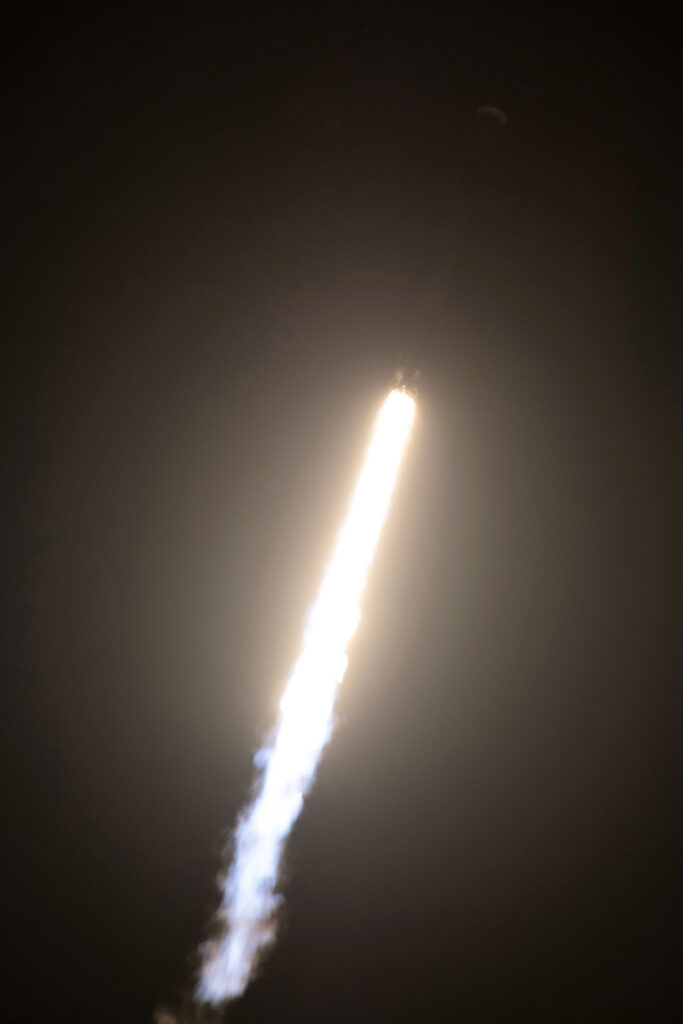The TARDIS is as much a part of Christmas as turkey, mince pies, and mulled wine, and former “Doctor Who” showrunner Steven Moffat certainly knows his way around a festive adventure. This year’s holiday offering, “Joy to the World”, is the writer’s ninth, and it comes with all the trimmings you’d expect.
Alongside the obligatory festive moments, Moffat (the brains behind “Blink”, “The Girl in the Fireplace” and “Heaven Sent”) brings his trademark clockwork plotting to the holiday party. In “Joy to the World”, the Doctor spends Christmas in the company of the titular Joy (“Bridgerton”‘s Nicola Coughlan), as the duo have an eventful stay in a hotel that provides a gateway to the most exciting destinations in history — and stumble on a sinister plot instigated by an evil corporation.
Below we explain what the bad guys are up to, and how Joy manages to live up to her name.
Spoilers ahead! Don’t peek unless you want to ruin your Christmas surprises.
Check out our How to Watch Doctor Who Christmas Special guide to find the best place to watch in your country, and then come back to compare notes when you’ve seen it. We’ll be waiting.
What is the Time Hotel?
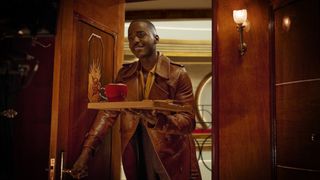
In 4202, guests can check into a London hotel where every door is a portal to another time and destination. As the Doctor puts it, it’s essentially the answer to the biggest mystery in the universe: “Why is there always an extra door in your hotel room and why is it always locked?” For this reason, you can only use a room if it’s not already occupied in its local time period.
Services available to Time Hotel guests include kitchens located half an hour in the future, designed so that your meal can be prepared before you’ve even ordered it. And for the benefit of British guests old enough to remember a certain kids’ cartoon from the 1970s, you can pick up era-appropriate outfits at Mr Benn’s Any Era Clothes in the hotel lobby. It’s worth noting the red knight costume in the window display, much like the one Mr Benn wore on TV.
We also spotted a caveman chatting with a group of World War II army officers, which we’re pretty sure is a reference to the residents of Button House in “Ghosts”.
How does Joy find herself at the Time Hotel?
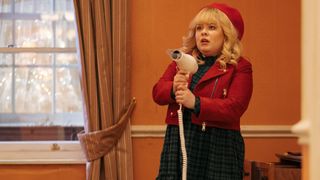
Entirely by accident.
Joy actually checks into the very ordinary Sandringham Hotel in London for the 2024 holiday season. We later learn that her mother died in hospital at Christmas during the COVID-19 pandemic — lockdown rules at the time meant that, tragically, Joy had to say goodbye via an iPad. Feelings of regret mean she’s wanted to escape the festive season ever since.
She becomes involved in the “star seed” plot when the Time Hotel’s Silurian manager (Jonathan Aris) wanders into her room in London — uninvited, we should add — with a briefcase handcuffed to his wrist.
What’s the deal with the briefcase?
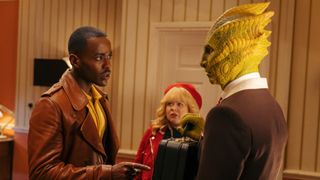
The briefcase appears to be sentient and can attach itself to whoever seems most likely to help it achieve its goals. Once the case has locked on to its host they must do its bidding, telling anybody who’ll listen that, “The star seed will bloom and the flesh will rise.” Unfortunately, once it’s done with them they’ll be vaporized.
The briefcase’s mission? To ensure that the atoms contained within can start a chain reaction and grow into a fully fledged star. There’s nothing altruistic about the scheme, however, because Villengard — the biggest arms manufacturer in recorded history — wants to use the new star as a limitless source of energy.
Where have we encountered Villengard before?
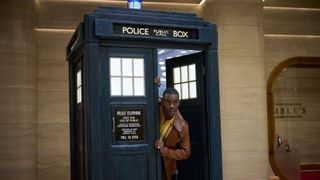
Villengard was first mentioned in “The Empty Child”/”The Doctor Dances” two-parter (also written by Moffat) way back in 2005. Christopher Eccleston’s Ninth Doctor recognized that Jack Harkness’s Sonic Blaster originated in the weapons factories of Villengard, and also hinted very strongly that he destroyed the facility.
The Twelfth Doctor (Peter Capaldi) and the First Doctor (David Bradley) later visited the ruins of Villengard in another Moffat story, “Twice Upon a Time” (2017). And the corporation was responsible for perpetuating a forever war — it’s good for the share price, apparently — on Kastarion 3 in Moffat’s “Boom“, which aired earlier this year.
Why does the Doctor have to wait around in the Sandringham Hotel for a year?
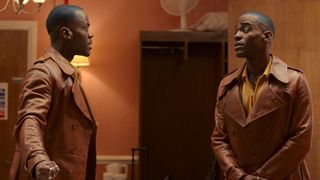
When the Doctor inadvertently activates the briefcase’s self-destruct device, using the TARDIS to track down the four-digit deactivation code is not an option — it has something to do with re-engaging the causal nexus. But, help comes courtesy of a future version of the Doctor, who delivers the code and whisks Joy away to the Time Hotel.
Unfortunately for the “original” Doctor, getting back to this point in time involves going “the long way round” and living a linear, one-thing-after-another lifestyle as if he were some ordinary human. Still, things could be worse: a) he only has to wait a year to find another route back to the Time Hotel; and b) in the interim, he has a great time befriending Sandringham Hotel manager Anita (Steph De Whalley).
Besides, when it comes to waiting around, 365 days is nothing for a Time Lord. Jodie Whittaker’s Doctor was imprisoned by the Judoon for decades in “Revolution of the Daleks”, while the Matt Smith incarnation spent centuries protecting Trenzalore in 2013 Christmas special “The Time of the Doctor”.
Why is the Time Hotel important to the Villengard plan?

The problem with growing stars from scratch is that it takes time, lots of time. The Time Hotel comes in handy because it provides a gateway to — as Louis Armstrong might put it — all the time in the world. And, seeing as the Doctor calculates that it would take approximately 65 million years for the star seed to fully bloom, a door leading to a time period when dinosaurs ruled the Earth would seem ideal — hence the surprise cameo from a hungry Tyrannosaurus Rex.
How does Joy bring joy to the world?
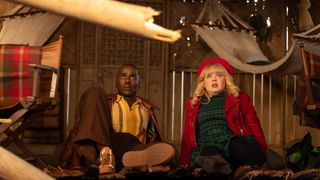
Millions of years later, the Doctor and Joy track down the briefcase they’ve just seen eaten by a T-Rex. With the star ready to explode into life — and threatening to engulf the Earth in the process — Joy grabs the briefcase and absorbs the seed into herself. The Doctor is concerned but she says she’s entirely happy with the prospect of becoming a star, telling him she’s not dying, she’s “changing”. She also explains that she (along with the previous briefcase bearers) will ensure both that Earth stays safe, and that the star is kept out of Villengard’s reach. She also strongly encourages the Doctor to find a friend, a common theme whenever the Time Lord finds him or herself without a companion.
As Joy ascends to the heavens, the new star becomes visible throughout history, providing inspiration to World War II Manchester, Hillary and Tenzing ascending Everest in 1953, and former companion Ruby Sunday in the present day. Joy’s mother also turns into stardust to join her daughter in the cosmos.
But Joy saves her biggest reveal for last, when the exact location and date of her final farewell is confirmed to be Bethlehem in the year 0001. Apparently these aren’t the first reports of a new star fitting this description…
“Doctor Who: Joy to the World” is available on BBC iPlayer in the UK and Disney+ in the rest of the world.
